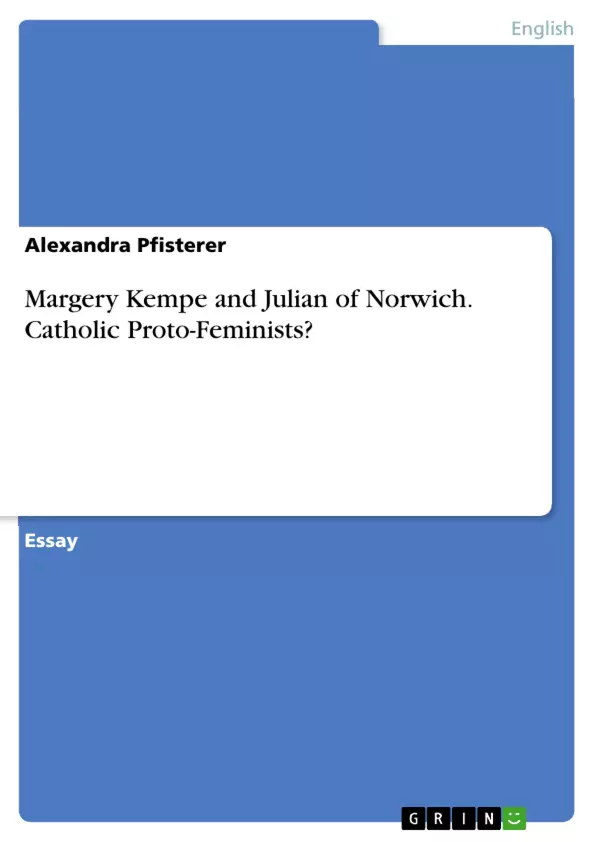Margery Kempe and Julian of Norwich – Catholic Proto-feminists?
When thinking of great English writers over the centuries, the earliest female writers who come to mind often are Jane Austen or Emily Brontë. However, there are many extraordinary female writers who often are being overlooked.
While exploring testimonies of women’s creativity in a time, when participating at the artistic, creative and intellectual exchange of society was not commonly part of roles and expectations attributed to women, I came across two female writers that I found particularly interesting.
The aim of this essay is to introduce these two extraordinary medieval female writers, Margery Kempe and Julian of Norwich, by briefly outlining their biographies and the main characteristics of their writing. Furthermore, commonalities and differences of these two female writers will be defined. Finally, it will be explained why these texts still have a relevance in a broader context today.
Beforehand, the key terms of this Essay shall be defined. The term gender is here being used as the distinction of sex and the constructed way of assigning meaning to people and behaviours due to their biological sex combined with this distinction. The most important authority to define gender related views in the here considered period is the catholic church. By devotion, religious devotion in the sense of worship, dedication and strong religious commitments is meant.
In order to understand why the two women presented in the following section are so remarkable, it is necessary to consider the position and education of women in mediaeval times.
Inhaltsverzeichnis (Table of Contents)
- Margery Kempe and Julian of Norwich - Catholic Proto-feminists?
- Key Terms
- Women in Medieval Times
- Margery Kempe
- Julian of Norwich
- The Relevance of Margery Kempe and Julian of Norwich
Zielsetzung und Themenschwerpunkte (Objectives and Key Themes)
This essay aims to introduce two extraordinary medieval female writers, Margery Kempe and Julian of Norwich, by outlining their biographies and the main characteristics of their writing. It will also define commonalities and differences between these two writers and explain why their texts remain relevant in a broader context today.
- The role of women in medieval society
- The influence of the Catholic Church on gender roles
- The impact of religious devotion on women's lives
- The unique writing styles and themes of Margery Kempe and Julian of Norwich
- The enduring relevance of their work in contemporary society
Zusammenfassung der Kapitel (Chapter Summaries)
- This essay begins by outlining the challenges faced by women in medieval times, specifically their limited access to education and their restricted social roles. It highlights the dominant influence of the Catholic Church in shaping gender norms and expectations.
- The second chapter focuses on Margery Kempe, a married middle-class woman from Norfolk who dedicated her life to religious devotion after experiencing mystical visions. The chapter explores her numerous pilgrimages, her piety, and her controversial writings in "the book of Margery Kempe," which details her religious and secular experiences.
- The third chapter introduces Julian of Norwich, another female writer who experienced visions and became an anchoress. The chapter discusses Julian's book "A Revelation of Love" and its exploration of complex theological topics, including the Trinity, Christ's passion, and the importance of unconditional love.
Schlüsselwörter (Keywords)
This essay explores the lives and writings of two influential female writers in medieval England, Margery Kempe and Julian of Norwich, focusing on their religious devotion, their challenges in a patriarchal society, and the enduring significance of their work. It delves into key themes such as gender roles, the influence of the Catholic Church, mysticism, and the representation of the feminine in religious discourse. The essay emphasizes the significance of these women's contributions to literary culture and their potential role as "Catholic proto-feminists."
- Citation du texte
- Alexandra Pfisterer (Auteur), 2019, Margery Kempe and Julian of Norwich. Catholic Proto-Feminists?, Munich, GRIN Verlag, https://www.grin.com/document/508851



